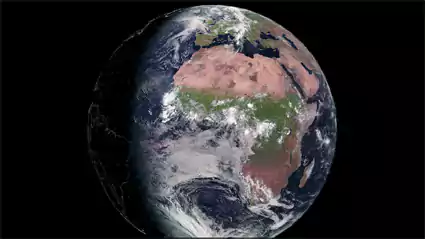The ice at the Earth’s poles is melting, and the water entering the ocean is increasing its weight near the equator.
Did you know that the Earth’s rotation speed is decreasing due to the melting ice at the poles? Yes, the Earth is now rotating slower than before. Scientists explain that the ice frozen at the Earth’s poles is rapidly melting, causing the Earth’s weight near the Equator to continuously increase. Consequently, the Earth has begun rotating more slowly, affecting the timing of clocks. All of this is occurring due to global warming. How? Let’s delve into it. We are all familiar with the term global warming, where the Earth’s temperature is steadily rising. In such a scenario, the ice at the Earth’s poles is melting, and the water from it is increasing the weight near the equator. This study has been published in Nature. According to the study, this phenomenon is causing the Earth’s rotation speed to decrease, potentially necessitating a reduction of one second in clock time. This is termed a negative leap second, which may need to be implemented in clocks by 2029.
Experts involved in the study suggest that this could pose challenges for computer network timing, unlike any encountered before, potentially leading to alterations in the UTC time standard. Study author Duncan Agnew explains that the melting ice at the poles is increasing the Earth’s mass, thereby affecting its angular velocity.
It’s worth noting that it has taken millions of years for the Earth’s rotation speed to decrease. According to a study published in Paleoceanography and Paleoclimatology, 70 million years ago, the days were much shorter, lasting only 23.5 hours a day. Today, global warming remains a paramount concern for the world. The Earth’s temperature continues to rise, leading to exacerbated natural disasters. Scientists are diligently seeking ways to mitigate global warming and control climate change. According to a report released in July 2023, greenhouse gas emissions are currently at their peak, with 54 billion tons of carbon dioxide being emitted annually. Consequently, the Earth’s surface temperature has increased by 1.14 degrees Celsius since 1800, with a further increase of 0.2 degrees Celsius per decade.
